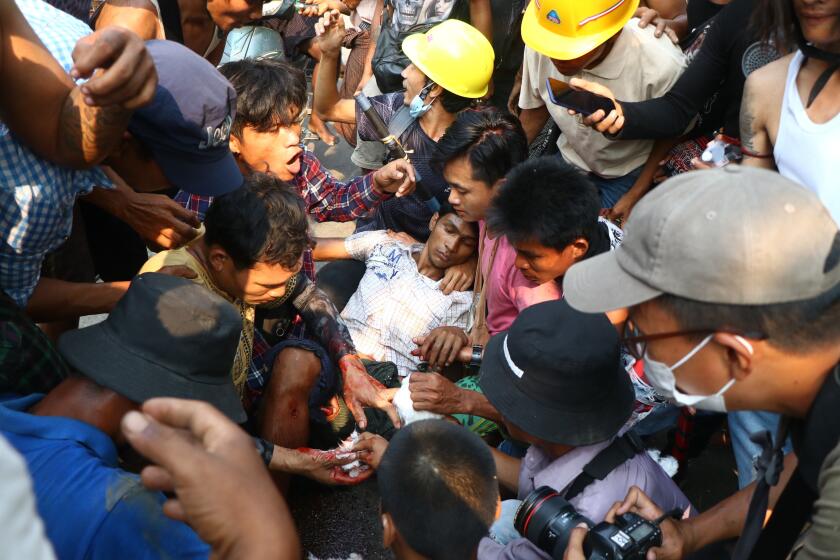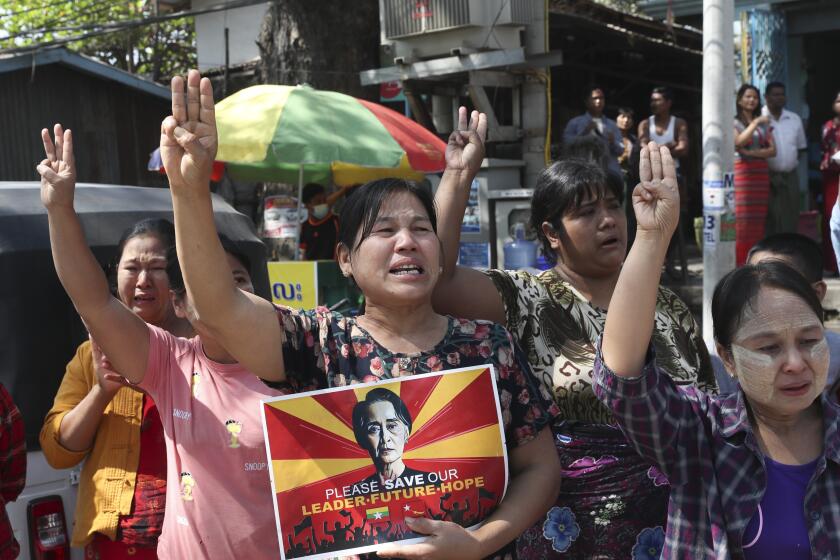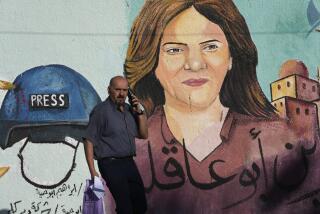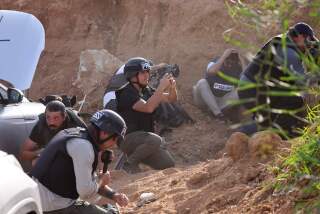Two journalists detained as Myanmar junta clamps down on press
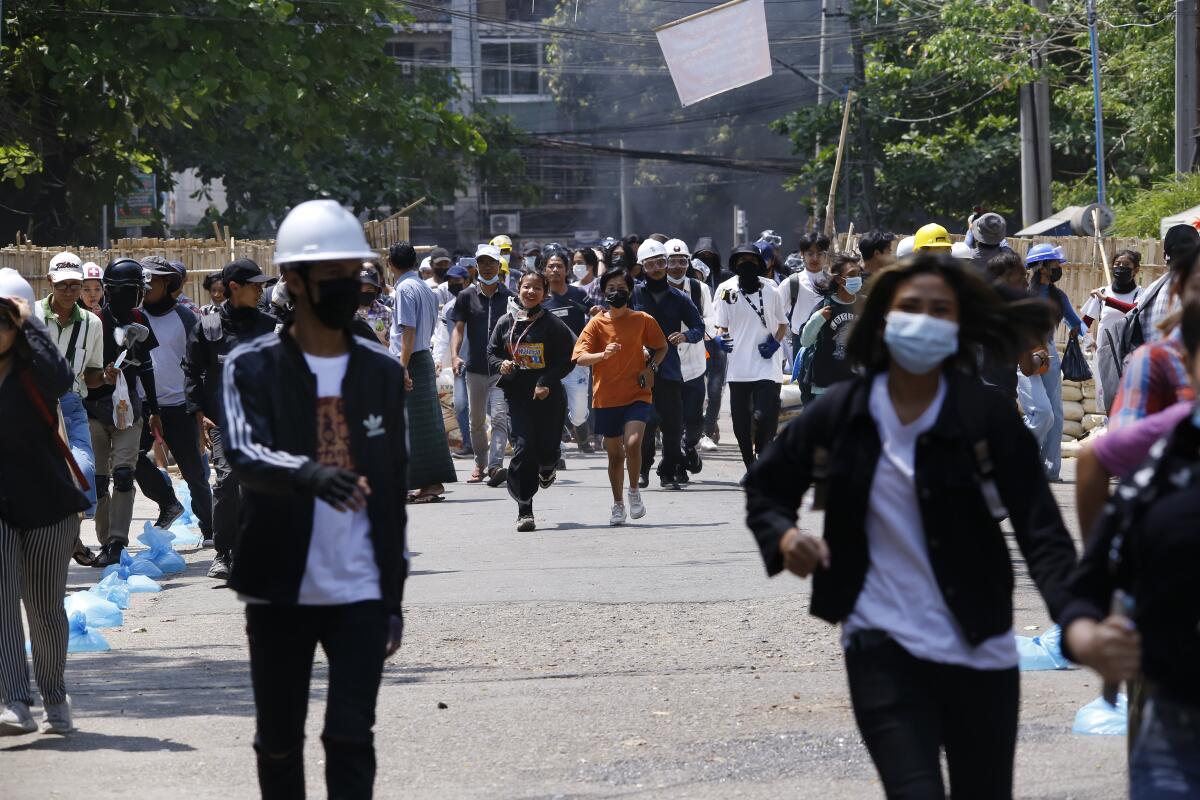
YANGON, Myanmar — Two more journalists were detained in Myanmar on Friday, part of the junta’s intensifying efforts to choke off information about resistance to last month’s coup.
Mizzima News reported that one of its former reporters, Than Htike Aung, and Aung Thura, a journalist from the BBC’s Burmese-language service, were detained by men who appeared to be plainclothes security agents outside a court in the capital of Naypyitaw. The journalists were there to cover legal proceedings against Win Htein, a detained senior official from the National League for Democracy, the party that ran the country before the takeover.
The coup reversed years of slow progress toward democracy after five decades of military rule. In the face of persistent strikes and protests against the takeover, the junta has responded with an increasingly violent crackdown and efforts to severely limit the information reaching the outside world. Security forces have fired on crowds, killing hundreds, internet access has been severely restricted, private newspapers have been barred from publishing, and protesters, journalists and politicians have been arrested in large numbers.
About 40 journalists have been arrested since the Feb. 1 coup, with roughly half still in detention, including Thein Zaw of the Associated Press.
The increasingly brutal measures taken by the junta drew condemnation from a group of ambassadors from Western countries Friday as well as unusually strong rebukes from leaders in Indonesia and Malaysia.
A statement from the BBC said it is “extremely concerned” that Aung Thura had been taken away by unidentified men.
Myanmar’s ruling junta declares martial law in parts of the country’s largest city as more protesters are killed in the state’s crackdown on dissent.
“The BBC takes the safety of all its staff in Myanmar very seriously and we are doing everything we can to find Aung Thura,” the organization said, adding that he was an accredited journalist with many years of reporting experience. It called on the authorities “to help locate him and confirm that he is safe.”
The reporters were taken into custody a day after Kyi Toe, a spokesman for the National League for Democracy, was arrested, according to a Facebook post by Phyo Zeya Thaw, a party official.
Kyi Toe had been a major source of information in the early days following the Feb. 1 coup, after the ousted civilian government’s de facto leader Aung San Suu Kyi and other senior officials were detained. The takeover came the same day that newly elected lawmakers were supposed to take take their seats in parliament.
Amid a crackdown on the press, no privately owned newspapers were published this past week for the first time in eight years, following bans and voluntary suspensions. The military government also has banned at least five local news organizations from disseminating information on any platform, but its orders were mostly ignored.
YouTube says it has removed five channels run by Myanmar’s military as demonstrators defy violence by security forces to stage anti-coup protests.
Restrictions on the internet have also been in place since shortly after the coup, including a blockage of mobile internet access. Broadband Wi-Fi service remains available, though spotty.
Despite a crackdown that has killed more than 200 demonstrators so far, protesters were back in the streets Friday morning in several cities and towns. Some rallies proceeded without violence, but in the town of Aungban in eastern Shan state, the online Tachileik News Agency reported that at least seven people were injured when security forces sought to break up their march using tear gas, rubber bullets and live ammunition.
Eleven News, a major media group, reported on Twitter that seven people had been killed in Aungban, but that death toll could not immediately be confirmed, though photos of at least one of the victims were posted on social media.
The independent Assistance Assn. for Political Prisoners reported that as of Thursday, it had verified 224 killings linked to the coup’s aftermath, more than half of them in Yangon, the biggest city. It said 2,258 people have been arrested or charged, with 1,938 still detained or evading arrest.
A group of ambassadors from Western countries called the violence “immoral and indefensible” in a statement Friday.
“Internet blackouts and the suppression of the media will not hide the military’s abhorrent actions,” read the statement from ambassadors to Myanmar from the European Union, several EU countries, Britain and the United States.
Myanmar’s neighbors had been more tentative in their response. But Indonesian President Joko Widodo issued a strong statement on Friday, urging a halt to violence and asking other regional leaders to hold a summit on the crisis.
“Indonesia urges that the use of violence in Myanmar be stopped immediately to avoid more victims. The safety and welfare of the people must be a top priority,” Widodo said in a televised address. “Indonesia also urges dialogue and reconciliation to be carried out immediately to restore democracy, peace and stability in Myanmar.”
Widodo, the leader of Southeast Asia’s largest economy, said that he will immediately speak with Brunei, the current chair of the Assn. of Southeast Asian Nations, to set up a meeting of leaders of its 10 member countries.
Malaysia’s Prime Minister Muhyiddin Yassin supported Widodo’s call for an ASEAN summit, saying he was “appalled by the persistent use of lethal violence against unarmed civilians, which has resulted in a high number of deaths and injuries, as well as suffering across the nation.”
More to Read
Sign up for Essential California
The most important California stories and recommendations in your inbox every morning.
You may occasionally receive promotional content from the Los Angeles Times.
